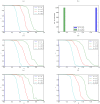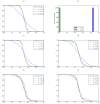An application of evolutionary game theory to social dilemmas: the traveler's dilemma and the minimum effort coordination game
- PMID: 24709851
- PMCID: PMC3977969
- DOI: 10.1371/journal.pone.0093988
An application of evolutionary game theory to social dilemmas: the traveler's dilemma and the minimum effort coordination game
Abstract
The Traveler's Dilemma game and the Minimum Effort Coordination game are two social dilemmas that have attracted considerable attention due to the fact that the predictions of classical game theory are at odds with the results found when the games are studied experimentally. Moreover, a direct application of deterministic evolutionary game theory, as embodied in the replicator dynamics, to these games does not explain the observed behavior. In this work, we formulate natural variants of these two games as smoothed continuous-strategy games. We study the evolutionary dynamics of these continuous-strategy games, both analytically and through agent-based simulations, and show that the behavior predicted theoretically is in accord with that observed experimentally. Thus, these variants of the Traveler's Dilemma and the Minimum Effort Coordination games provide a simple resolution of the paradoxical behavior associated with the original games.
Conflict of interest statement
Figures

 is low, and make lower claims when
is low, and make lower claims when  is high. (b) MEC game: individuals expend more effort when the effort cost
is high. (b) MEC game: individuals expend more effort when the effort cost  is low, and less effort when
is low, and less effort when  is high.
is high.
 in the smoothed TD game over the last
in the smoothed TD game over the last  of
of  generations versus the reward/punishment parameter
generations versus the reward/punishment parameter  for different values of the smoothing parameter
for different values of the smoothing parameter  , on a complete graph (a), a random regular graph with degree 10 (c), a scale-free graph with mean degree 10 (d), 2D lattice graph with 4 neighbors (e), and 2D lattice graph with 8 neighbors (f). Parameter values:
, on a complete graph (a), a random regular graph with degree 10 (c), a scale-free graph with mean degree 10 (d), 2D lattice graph with 4 neighbors (e), and 2D lattice graph with 8 neighbors (f). Parameter values:  for lattice networks and
for lattice networks and  for other networks,
for other networks,  , and
, and  . (b) Number of individuals versus their claims
. (b) Number of individuals versus their claims  , when
, when  and
and  , on a complete graph with parameter values:
, on a complete graph with parameter values:  , and
, and  .
.
 in the smoothed MEC game over the last
in the smoothed MEC game over the last  of
of  generations versus the effort cost parameter
generations versus the effort cost parameter  for different values of the smoothing parameter
for different values of the smoothing parameter  , on a complete graph (a), a random regular graph with degree 10 (c), a scale-free graph with mean degree 10 (d), 2D lattice graph with 4 neighbors (e), and 2D lattice graph with 8 neighbors (f). Parameter values:
, on a complete graph (a), a random regular graph with degree 10 (c), a scale-free graph with mean degree 10 (d), 2D lattice graph with 4 neighbors (e), and 2D lattice graph with 8 neighbors (f). Parameter values:  for lattice graphs and
for lattice graphs and  for other graphs,
for other graphs,  , and
, and  . (b) Number of individuals versus their effort levels
. (b) Number of individuals versus their effort levels  , when
, when  and
and  , on a complete graph with parameter values:
, on a complete graph with parameter values:  , and
, and  .
.Similar articles
-
Evolutionary dynamics of the traveler's dilemma and minimum-effort coordination games on complex networks.Phys Rev E Stat Nonlin Soft Matter Phys. 2014 Oct;90(4):042134. doi: 10.1103/PhysRevE.90.042134. Epub 2014 Oct 22. Phys Rev E Stat Nonlin Soft Matter Phys. 2014. PMID: 25375465
-
Stochastic evolutionary dynamics resolve the Traveler's Dilemma.J Theor Biol. 2012 Jun 21;303:119-27. doi: 10.1016/j.jtbi.2012.03.014. Epub 2012 Mar 23. J Theor Biol. 2012. PMID: 22465111 Free PMC article.
-
Evolution of cooperation in spatial traveler's dilemma game.PLoS One. 2013;8(3):e58597. doi: 10.1371/journal.pone.0058597. Epub 2013 Mar 20. PLoS One. 2013. PMID: 23526998 Free PMC article.
-
Universal scaling for the dilemma strength in evolutionary games.Phys Life Rev. 2015 Sep;14:1-30. doi: 10.1016/j.plrev.2015.04.033. Epub 2015 May 5. Phys Life Rev. 2015. PMID: 25979121 Review.
-
From genes to games: cooperation and cyclic dominance in meiotic drive.J Theor Biol. 2012 Apr 21;299:120-5. doi: 10.1016/j.jtbi.2011.04.032. Epub 2011 May 13. J Theor Biol. 2012. PMID: 21600218 Review.
Cited by
-
A dilemma study of the traffic flow system emerged due to the lane-change by follower's tailgating effect.Sci Rep. 2025 Aug 9;15(1):29195. doi: 10.1038/s41598-025-14760-z. Sci Rep. 2025. PMID: 40783591 Free PMC article.
-
Evolution of Cooperation in Social Dilemmas on Complex Networks.PLoS Comput Biol. 2016 Feb 29;12(2):e1004779. doi: 10.1371/journal.pcbi.1004779. eCollection 2016 Feb. PLoS Comput Biol. 2016. PMID: 26928428 Free PMC article.
References
-
- Kollock P (1998) Social dilemmas: The anatomy of cooperation. Annual Review of Sociology 24: 183–214.
-
- Axelrod R (2006) The Evolution of Cooperation. Basic books.
-
- Hardin G (1968) The tragedy of the commons. Science 162: 1243–1248. - PubMed
-
- Flood MM (1958) Some experimental games. Management Science 5: 5–26.
-
- Hamilton W, Axelrod R (1981) The evolution of cooperation. Science 211: 1390–1396. - PubMed
MeSH terms
LinkOut - more resources
Full Text Sources
Other Literature Sources

